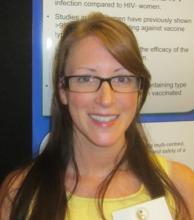BERNALILLO, N.M. – Women with HIV probably need a booster shot of HPV vaccine within 2 years to maintain efficacy, according to a Canadian study of quadrivalent HPV vaccine (Gardasil) in 136 HIV-positive women.
Antibody response to the vaccine is strong enough at 2 years to protect about 90% of HIV-negative women against HPV [human papillomavirus]. "But in our population, with approximately a year and a half of follow-up, that number decreased to about 63%. There’s a much more rapid decline in antibody levels" among HIV-positive women, "which suggests this population might in fact benefit from a booster," said lead investigator Erin Moses, R.N., a researcher at the Women’s Health Research Institute in Vancouver, B.C.
Cervical specimens from the women were negative for HPV DNA – and their blood was negative for HPV antibodies– both at screening and 3 months later when they received the vaccine. They were then assessed at 6, 12, and 18 months for cervical HPV DNA.
The initial seroconversion rate was high at about 99%, but "we saw nine breakthrough infections" to HPV types targeted by the vaccine "in a short period of follow up. Although we’ve only been monitoring these women for approximately a year and a half, we have already seen five [new] infections of HPV type 18. Of those five, we saw two persistent infections, which means these women had two positive tests 6 months apart for HPV 18," Ms. Moses said at the Infectious Diseases Society for Obstetrics and Gynecology annual meeting.
Women who picked up a new infection had a mean CD4 nadir of 69 cells/mm3; women who did not had a mean nadir of 228 cells/mm3, a significant difference. Women who became infected also were more likely to have a new sexual partner.
"We didn’t see a correlation between viral load" and new infections, "which was odd because typically you would think that if they have an unsuppressed viral load, they would be more at risk, but there was no correlation with that," Ms. Moses said.
The median age in the study was 40 years; about half the women were black, most of the rest were white. The median time since HIV diagnosis was 8 years, and 11% were coinfected with hepatitis C; 92% of the women were on highly active antiretroviral medications, and 69% had undetectable viral loads.
Ms. Moses said she had no relevant financial disclosures. The study was funded by Merck, the maker of Gardasil, and the Canadian Institutes of Health Research.


